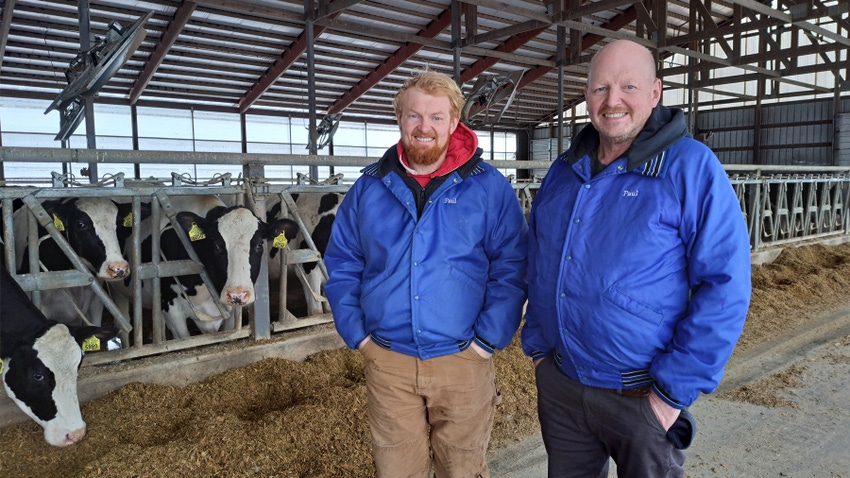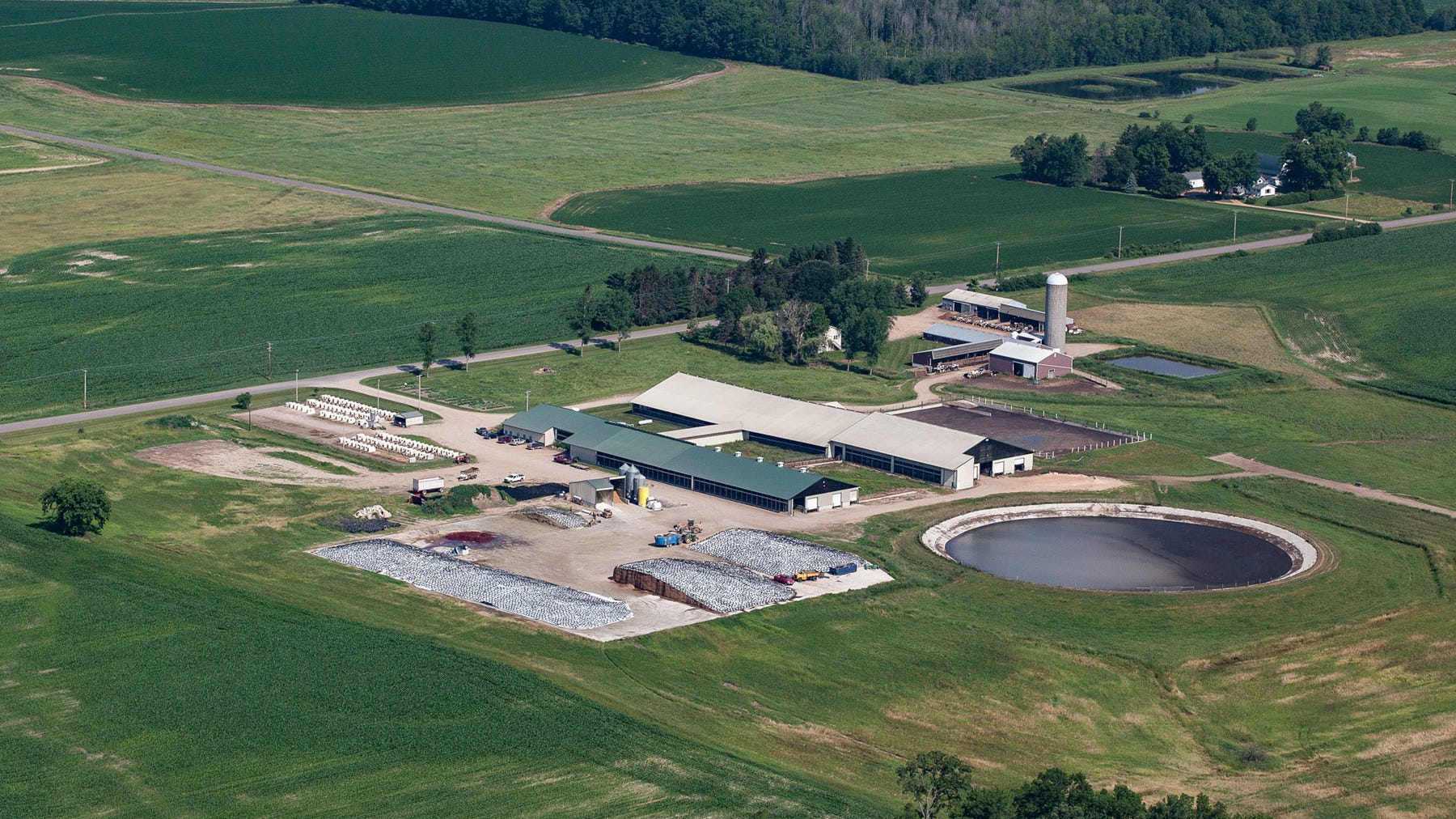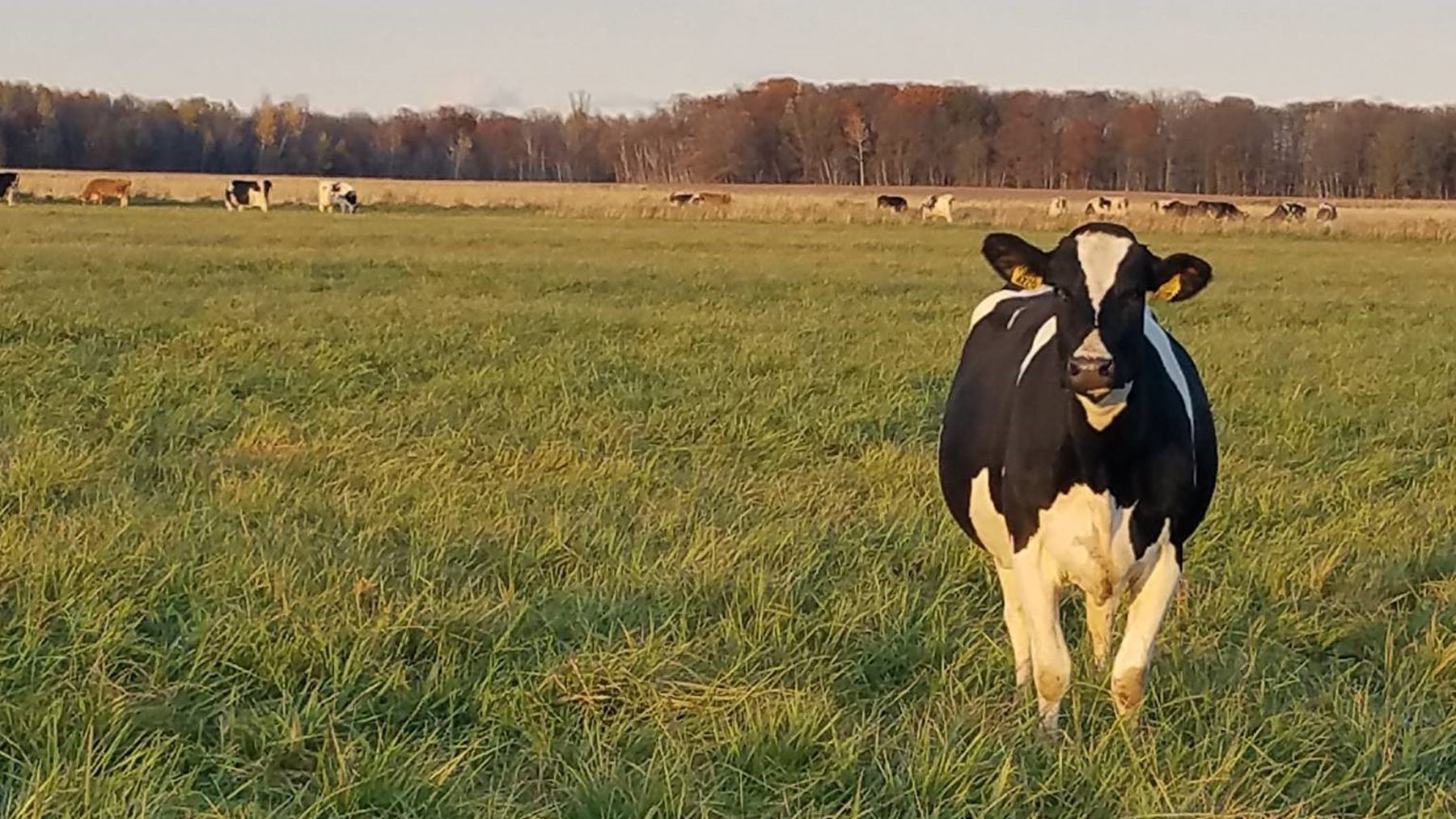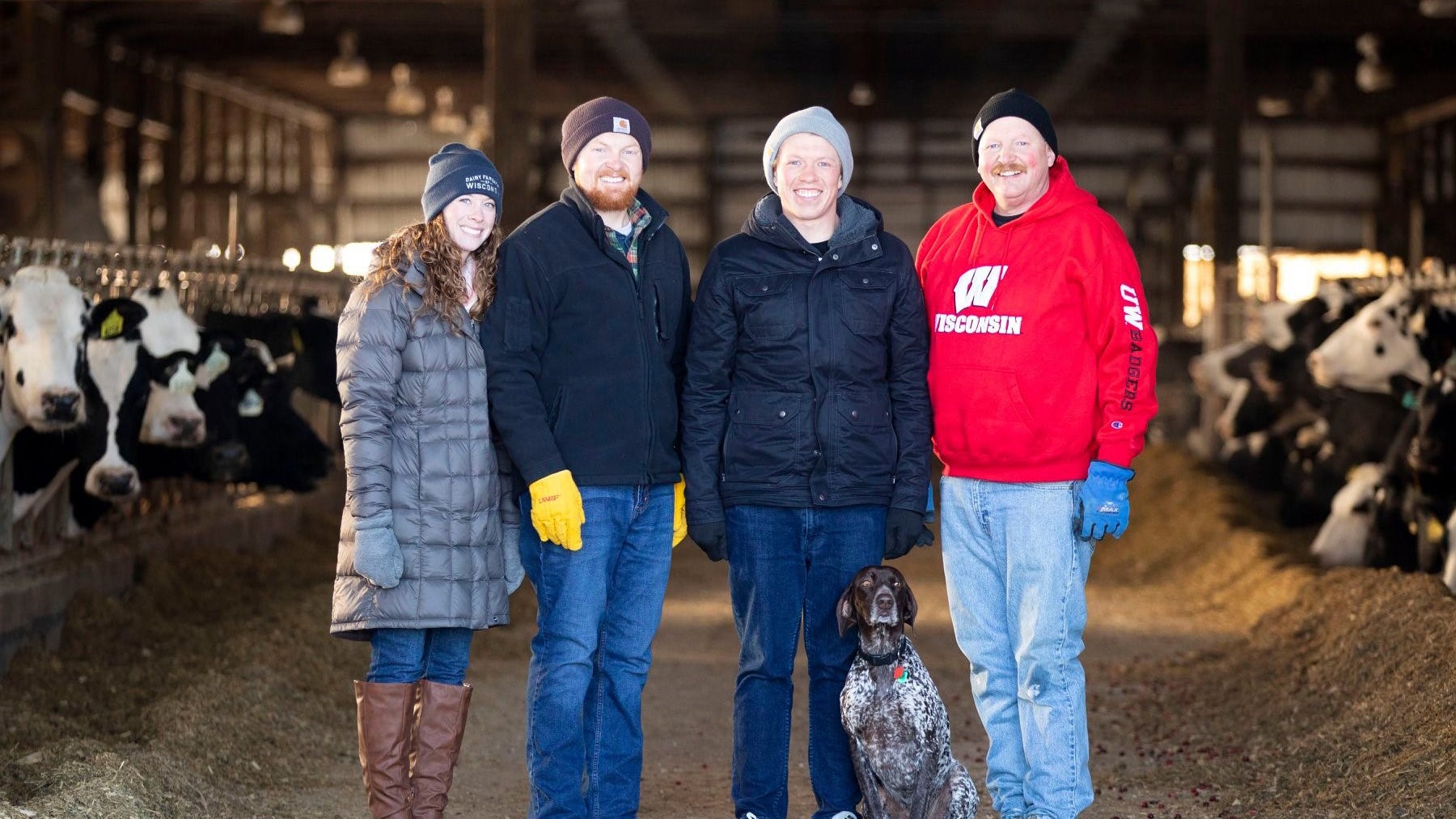
Matt Lippert grew up on the farm he operates today near Pittsville in Wood County, Wis., and is the third generation of his family to do so. In 2017, the farm was recognized as a Century Farm. Lippert and his sons, Paul and Carl, also own and operate a second Century Farm nearby from his mother’s side of the family.
Lippert is the youngest of five children. His father was gored by a Holstein bull the year Lippert was born and never fully recovered; he was diagnosed with multiple sclerosis shortly after. Lippert’s mother supported the family with secretarial jobs for the next 30 years while still working on the farm.
“My parents’ hard work and passion for the farm taught me at a young age that the farm was essential to the family and that it should never be given up,” Lippert says.
Growing up, Lippert was a member of both 4-H and FFA, where he learned many valuable skills that he uses today. Before attending college, he was responsible for managing the farm.
“I was the youngest and the only child left at home,” he explains. “My mother asked me when I was in seventh grade to keep the accounting ledger for our 20-cow farm.”
Just before Lippert graduated from Pittsville High School in 1978, his parents made a significant investment to modernize the farm and accommodate an older sibling returning home. Shortly after returning, however, the sibling realized farming was not for them and left the farm.
“This left my parents in a tricky situation, as the debt for the new barn, silo, manure facility and newly purchased land still needed to be repaid.” Lippert says.
At the time, it appeared that Lippert would have to choose between going to college and staying home to help his parents save the farm, even though he was not confident it could be saved. They found a renter, sold some land and dispersed the dairy herd. It seemed he would need to give up his dream of running the family farm. But Lippert is stubborn and did not give up on his dream. Instead, he bought some registered Holstein cows and kept them on other farms.
Expanding horizons
Lippert attended the University of Wisconsin-Madison and in 1982 earned a bachelor’s degree in dairy science and agriculture economics. During college, he worked as a Dairy Herd Information Association supervisor, a communications intern at Tri-State Breeders and a dairy policy intern for U.S. Sen. Bob Kasten. He says he was driven by a desire to learn everything he could to achieve a successful future for the farm. Lippert was named the Outstanding Senior in the College of Agricultural and Life Sciences.
After two years working as the Richland County Extension dairy and livestock agent and receiving a master’s degree in animal breeding from UW-Madison, in 1987 Lippert came back to operate the family farm with his wife, Martha, a fellow UW-Madison dairy science graduate. Together they pursued their vision of building the family farm and raising a family.
For 15 years, Lippert also worked as a dairy sales representative for Vita Plus Corp., and later as technical support and a farm management consultant. As with many young couples trying to establish a family and balance work, this was a busy time for the Lipperts. Lippert would get up early to milk cows before going to work for Vita Plus and would end his day balancing rations after helping with evening chores.
A season of change
In 2003, the couple decided to divorce. That same year, the Wood County ag Extension agent position came open. The position presented Lippert the opportunity to travel less, stay closer to home and help improve the ag conditions in his home county.
“Wood County is unique in that it has a strong dairy industry and is the largest cranberry-producing county in Wisconsin and the U.S.,” he says. Lippert continues balancing his Extension work with farming. In 2021, he became regional Extension dairy agent for Wood and Clark counties.
When Lippert returned to Wood County, he milked 40 cows. As time progressed, the dry cows were moved out of the milking barn, allowing a slight increase in herd size and a transition to a total mixed ration and better care for the dry cows. All crops were bought from neighboring farms.
In the mid-1990s, Lippert purchased a farm from a cousin, and began growing and managing crops on both farms using custom planting and harvest services. The barn on the other farm was modernized for milk cows, and the herd grew to 100 cows. Soon, he converted a machine shed on the new property to freestall housing, bringing cow numbers to 200.
In 2000, the two herds were combined into a new freestall barn and milking parlor, increasing cow numbers to 300. In 2021, another farm with quite a bit of capacity was purchased and converted to dry cow and heifer replacement housing.
Today, the Lipperts farm 2,075 owned and rented acres, and milk 710 registered Holstein and registered Jersey cows. They also raise 600 replacement heifers. Additional land has been purchased or rented to feed the herd and manage the manure economically. Recently, they bought some planting equipment so the farm relies less on custom operators in the spring, but custom operators are still used for the majority of field work.
All of these advancements would not be possible without a good succession plan, Lippert says. Grass Ridge Farm LLC was established in 2000 when the new dairy facility was constructed to allow for the eventual entry into the operation of both his sons, Paul, 35, and Carl, 34.

BIRD’S-EYE VIEW: Grass Ridge Dairy LLC includes 2,070 acres of land and is home to 710 registered Holsteins and registered Jersey cows, and 600 dairy heifers. (Photos courtesy of Lippert family)
Paul joined the farm full time after graduating from UW-River Falls in 2012 with a bachelor’s degree in dairy science. He is herd and employee manager and handles much of the dairy’s day-to-day operation.
Carl is not involved in the dairy but remains interested in the farm. He graduated from UW-River Falls with a bachelor’s degree in dairy science and from UW-Stevens Point with a bachelor’s degree in computer science. He currently lives and works in South America.
“The growth of the farm has allowed for the hiring of extra help, which gives me more flexibility and the pleasure of seeing the farm and family continue to develop and improve,” Lippert says. The farm employs 12 full-time and five part-time workers.
“Although the farm has expanded its crop production, the business is — first and foremost — a dairy farm,” Lippert says. “All crops are grown to support the dairy. Dairy-beef and bull calves are sold at a week of age.”
Top production
The latest DHI reports show that the farm has 590 Holsteins with a rolling herd average of 30,995 pounds of milk; 4.1% butterfat; 1,285 pounds of fat; 3.3% protein and 1,029 pounds of protein. There are also 110 Jerseys averaging 22,221 pounds of milk; 5.1% butterfat; 1,142 pounds of fat; 3.8% protein and 837 pounds of protein.
“For two of the last four years, the Jerseys have been the top-ranked herd at Central Star Cooperative DHI, which includes herds in Wisconsin, Michigan and Ohio,” Lippert says.
All cattle are registered and routinely classified. The herd qualifies for the Holstein Association USA Progressive Genetics and Progressive Breeder awards. The latest breed age average for Holstein classification is 105.9%, which ranks near the top in the country for herds over 500 cows.
Although the bottom 40% of the herd is bred to AI beef bulls, there are still 630 replacement heifers on the farm. This size of replacement herd has allowed for the sale of as many as 100 fresh heifers each year to other dairy farms in addition to normal culling. The herd is milked three times a day in a double-12 milking parlor. Monthly somatic cell counts have been under 100,000 every month for the past 10 years.

GRAZING: About 100 acres are in managed rotational grazing for heifers and dry cows.
Lippert plants about 900 acres of corn each year. Depending on need, about half is grown for silage. The remainder is harvested as either high-moisture or dry corn. He grows about 250 acres of soybeans.
“Soybeans are sold and used as a hedge for the cost of purchased protein,” he says. “It is also desirable to have another crop in the rotation.”
He grows some wheat too, which also adds another crop to the rotation. “Straw is used as bedding or for dry cow rations, and the harvest time opens up opportunities to handle manure, summer-established alfalfa, or plant cover crops,” he notes.
Hay and haylage crops include alfalfa grass and legume grass mixtures. To diversify the rotation, annual forage mixtures of sorghum-sudangrass, Italian ryegrass, annual clovers and vetch have been included on up to 100 acres.
About 100 acres are in managed rotational grazing. Winter crops have increased to about 500 acres. Triticale is planted if it is intended for May-harvested forage. Rye is planted strictly as a cover crop.
Giving back
Despite having a lot on his plate both on and off the farm, Lippert has been active in several farm organizations and in his community. He served on the Wisconsin Holstein Association board of directors for six years and the executive board for four years. He also coached dairy bowl and dairy judging, and was a 4-H project leader.
He’s a Pittsville FFA Alumni member, serves on the Marshfield Area Chamber of Commerce and Industry Agri-Business Committee, was an actor in the Pittsville Area Community Theater, and is active in his church.

Dairy FAMILY: The Lippert family includes (from left) Trisha Blaser, Paul’s fiancee; Paul; Carl; Matt’s dog, Flicka; and Matt.
Master at a glance
Matt Lippert
Age: 63
Location: Pittsville, Wood County
Farming enterprises: Dairy cows and heifers, crops
Size of farm: 2,070 owned and rented acres, 710 registered Holstein and registered Jersey cows, 600 registered heifers
Years farming: 37
Family: Sons Paul and Carl
Read more about:
Master AgriculturistsAbout the Author(s)
You May Also Like






